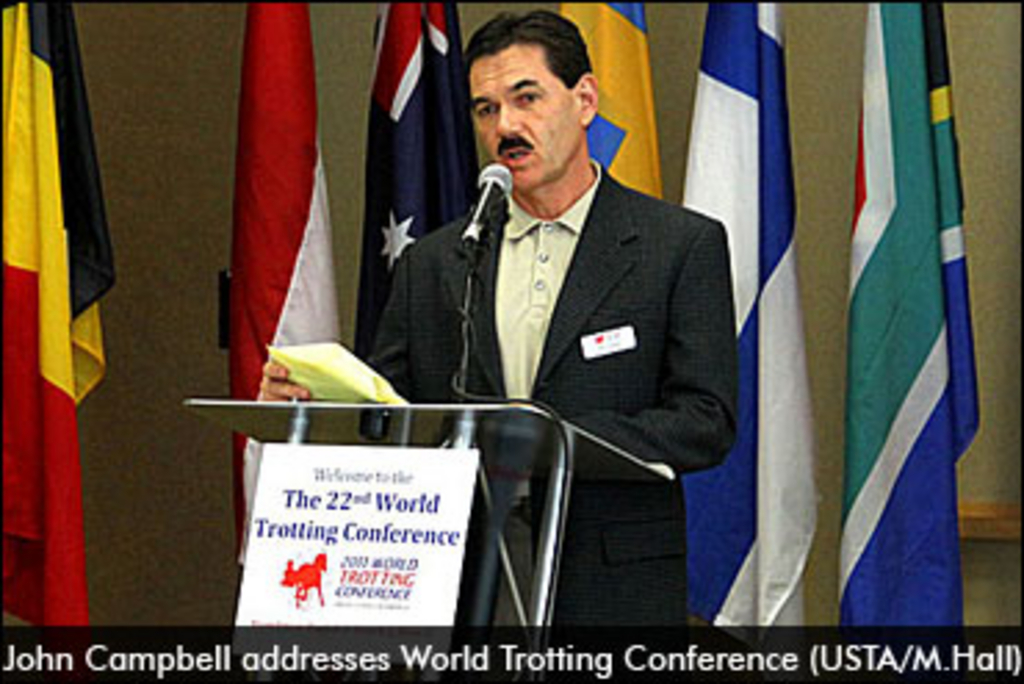
"They changed the [whipping] rule in Canada where you have to keep one line in each hand. I'm in agreement with that rule, but I may be the only one in the driver's colony. I hope that someday we adopt the Canadian rule, but I don't see it happening any time soon."
Those words were offered to the delegates in attendance as Hall of Fame driver John Campbell kicked off the 22nd World Trotting Conference this morning in New Jersey at the Hyatt Regency Jersey. Today’s session was the first of five scheduled as part of the Conference, and today’s theme was the State of the Industry.
Following the introductions and opening remarks by Mike Tanner, Executive Vice President and CEO of the United States Trotting Association, and Phil Langley, President of the USTA, Campbell addressed the representatives from 16 countries and the European Trotting Union in attendance as the keynote speaker.
From his viewpoint, the state of the industry in New Jersey has turned from dire to hopeful.
“We have not adapted to the market,” said Campbell, noting that new Meadowlands boss Jeff Gural will be trying ways to draw the fans back. "Jeff Gural and his people do a great job with their tracks. Mr. Gural and his people are going to make many positive changes to attract people back to bet on the races."
On the racing side of that equation, Campbell said, “The trick will be to draw the same good overnight horses that made the track successful in the past.
“The future of the track will present a huge challenge, unless our legislators realize that we need slots to compete,” he continued. “I believe that we’ll have gaming at the track in the not too distant future.
"When our field size and quality of horses goes down because of slot fueled racing in neighbouring states, it hurts our product. I believe there will be slots down the road at the Meadowlands and with Jeff Gural leading the Meadowlands, we'll be in very good hands."
Campbell also touched on what he believes is a missed opportunity in marketing harness racing.
"We're missing a lottery type bet. In New Jersey, we have three big lotteries. I'd love to see someone go to the New Jersey lotteries and get our game tied into the lottery.
"There are so many ideas that could be implemented and while some may not work, we haven't tried nearly enough," he said.
Jacques Chartier, the general secretary of the European Trotting Union (UET), later spoke about the work of that organization to further harmonize racing and breeding rules and work to ensure the racing industry remains in control of the online market for race wagering. He also reported that interest in the sport is growing, as evidenced by the admission of Serbia and Lithuania to the UET and the addition of Bulgaria and Croatia as prospective members.
Karyn Malinowski of Rutgers University spoke about research she directed that proved the worth of the standardbred and broader equine industries to New Jersey, and provided a framework under which such studies could be conducted in any jurisdiction.
“We not only did the study, but we made sure the members of the legislature knew the results,” Malinowski said. “You have to make sure you work to ‘sell’ the data, not just do the research and put it on the shelf if you expect elected officials to know what the industry means to the state.”
David Carr, Information & Research Manager at the USTA, offered some insight into the state of harness racing world wide, providing a statistical summary of the industry, which revealed some downward trends.
Carr said there are 1 billion Euros available in global purses and that the number of races globally from 2006 to 2010 has decreased by 19,000 races -- a drop of 11 per cent.
He also discussed the decline in wagering stating that the total global wager on harness racing is currently 11 billion Euros, which represents a 14 per cent decline from 2006 to 2010. The most significant decreases came from North America while during that same period wagering increases were seen in Australia, New Zealand, France, Sweden and Norway.
Carr also noted that the number of foals has decreased by 14 per cent from 2008 to 2010.
In addition, Carr led a panel discussion about the future of data exchange among the countries, who are increasingly trying to find ways to promote international simulcasting and track the performance of the progeny of “shuttle” stallions. The concepts briefly discussed by the group will be given closer scrutiny and discussion at the committee level.
Following their initial committee meetings this afternoon, the delegates and observers will travel to Meadowlands Racetrack to witness the fourth and penultimate leg of the 25th World Driving Championship, and will convene tomorrow morning for their second session, at which the theme will be “Integrity and Regulation.”
(With files from USTA)


I am impressed with John
I am impressed with John Campbell's comments at the World Trotting Conference and he's right. Recently he announced that he may possibly retire. It would be a massive loss to the industry if the governing bodies and/or race tracks did not appoint Mr. Campbell in some capacity as " an ambassador to harness racing". He has knowledge of the sport and foresight but above all he has integrity. We continually fail to "market" ourselves as a viable alternative to other gambling venues such as the lotteries, poker, etc. Unless we attract new and younger fans to harness racing, I fear that the racing industry will follow the same trend and plunge just like the stock market.